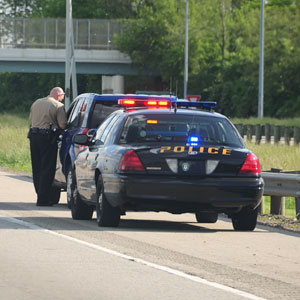Chapter 2: Knowing Your Rights: What Happens When You’re Pulled Over!
 What You Need To Disclose To Law Enforcement
What You Need To Disclose To Law Enforcement
If you are pulled over by a police officer for driving under the influence, you’ll do well to speak as little as possible. That said, there are certain things you are required by law to disclose. They include:
- Your driver’s license.
- Proof of auto insurance.
- Your current address.
If suspected of driving under the influence, you will also need to answer whether you’ll submit to a chemical test. You don’t have to submit to the preliminary alcohol screening test if it’s offered to you, but you are legally required to submit to a chemical test, whether it be a blood test or a breath test. If you don’t submit to a chemical test, you will lose your license for a minimum of a year.
You can decline to answer questions such as:
- How much have you had to drink?
- Where were you drinking?
- Where are you coming from?
- Where are you going?
- Who were you with?
These questions are simply beyond what’s legally required to answer, and answering them will most likely be used against you.
Navigating A DUI Stop
Navigating a DUI stop can be a stressful and confusing experience, to say the least. One common question is whether you can request an attorney during the stop. Understanding your rights in this situation is absolutely vital to protecting yourself legally.
You do not have the right to an attorney during the DUI stop, but you do have this right once you are under arrest and before any questioning begins. Beyond this, remember that while you should comply with basic identification and all of the other procedural requests the officer will make, you can assert your right to remain silent on other matters until you have legal representation.
Since you are not entitled to have an attorney present during the initial DUI stop, if you tell the officer who pulls you over that you won’t answer their questions until you have talked to an attorney, they may interpret it as a refusal to comply with certain procedures, such as the chemical test.
You can, of course, express your desire to speak with an attorney, but since you don’t have a right to one at this point in the process, don’t expect any immediate activity in response to you stating your wishes. At the stop, the police are most focused on conducting field sobriety tests and preliminary questioning to determine if there is probable cause for an arrest.
Another key aspect of being pulled over for DUI to be aware of is your right to refuse certain tests. Refusing to answer questions or to submit to chemical tests at the stop, whether it be because you want to wait for an attorney, or for any reason for that matter, can lead to serious consequences.
Don’t confuse field sobriety tests with chemical tests. While you can refuse FSTs, you cannot refuse the chemical test once you have been advised of the legal requirement to take it. This test typically involves a breath, blood, or urine sample to accurately measure your blood alcohol content.
You are not legally required to submit to field sobriety tests during a DUI stop. These tests, which include things like the walk-and-turn, the one-leg stand, and the horizontal gaze nystagmus, are designed to assess your physical coordination and cognitive function. You also have the right to refuse the preliminary alcohol screening (PAS) device, another FST, which is typically a handheld breathalyzer used at the scene.
These tests are not necessarily going to help the objective observer determine whether or not you’re actually under the influence of alcohol or drugs. And since there’s likely little benefit to you submitting to those tests, it’s probably best not to. But, while you can refuse to perform field sobriety tests, it’s important to understand the potential consequences you could face if you do.
For instance, if you refuse the FSTs, law enforcement officers will base their decision to arrest on other observable signs of intoxication. These may include your behavior, speech, odor of alcohol, and any visible signs of impairment. Be careful as you consider whether to take or refuse these tests. A lot is on the line, and a poor decision may have significant consequences on your case later in the process.
Being Placed Under Arrest
Being arrested for driving under the influence is serious and can have far-reaching consequences that affect several aspects of your life. Understanding what happens after a DUI arrest can help you navigate the process more effectively and mitigate these consequences.
In most cases, after being arrested for a DUI, you will be taken to the county jail. Here, you will go through the booking process, which includes having your fingerprints and photograph taken. In some jurisdictions, such as San Mateo County, if your blood alcohol level is near the legal limit and no aggravating factors are present, you might be taken to a sobering facility instead of jail. This program allows you to sober up before being released.
If your blood alcohol level is low, law enforcement may release you into the custody of a sober person who can drive you home. But for more serious cases, such as those involving high blood alcohol levels or causing injury, you may be booked into jail and required to post bail or remain in custody until you appear before a judge.
Upon being released, you will receive a notice to appear in court, usually scheduled about 30 days from the date of your arrest. This notice will include the details of your arraignment, which is your first court appearance. The arraignment is where you will be formally charged with the DUI offense. During this hearing, the judge will read the charges against you, and you will have the opportunity to enter a plea (guilty, not guilty, or no contest).
If you plead not guilty, the court will schedule future dates for pretrial motions, hearings, and possibly a trial. Depending on the outcome of your case, penalties for a DUI can include fines, license suspension, mandatory DUI education programs, community service, probation, and even jail time.
For more information on What Happens When You’re Pulled Over!, an initial consultation is your next best step. Get the information and legal answers you are seeking by calling (415) 782-6002 today.




